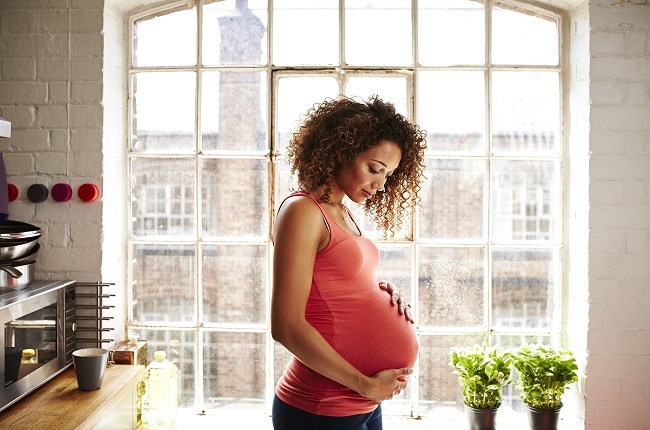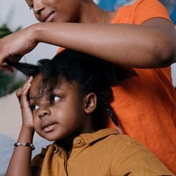
- Hair loss usually occurs during pregnancy and after delivery
- It's not serious enough to cause permanent hair loss and should begin to stop three to four months after delivery.
- Superfoods are especially important for moms-to-be and oil scalp massages may help with regrowth.
Pregnancy is a beautiful journey.
For nine months, a mommy-to-be experiences the different stages of her unborn child's growth, while bonding with them – a "spiritual period,” some mothers call it.
During pregnancy, a woman’s body goes through several changes to accommodate the life growing inside her. Some changes are welcome to a lot of women and their partners; however, some can trigger insecurities. One such change is hair loss. Losing hair during pregnancy is not uncommon, but as with most changes during pregnancy, it is temporary.
“When I was pregnant with my baby girl, I experienced so much hair loss that I thought something was wrong with me. My aunt did not experience any hair loss during her pregnancy journey; in fact, her hair grew like crazy! So, I was convinced that something wasn't right,” an East London mom Lumanyano Mndayi tells us.
“At one of my check-ups, I told the doctor my concerns, and she reassured me that I was perfectly normal, and nothing was wrong with me or my little girl. I suppose being a first-time mother also comes with its own paranoia,” she laughs.
“My doctor then recommended a few foods to include in my diet, as well as some hair products to try. She also warned me of ingredients to avoid in some hair and skin products, which really helped. Nine months later, my beautiful, healthy baby came bouncing out with a full head of hair herself!” Lumanyano says triumphantly.
Like Lumanyano, many women experience hair loss during pregnancy and might not even know why it’s happening.
Hair expert and salon owner, Edlyn Murefu Dingindawo explains this to us: “The term for this condition is telogen effluvium, which is the excessive shedding of hair that can occur one to five months following pregnancy, among other reasons.
READ MORE | Relaxed hair can be healthy too - 5 tips on how to care for your chemically treated tresses
“Hair loss usually occurs during pregnancy and after delivery. During this period, an increased number of hairs go into the resting phase, which is part of the normal hair loss cycle.
“This condition is not serious enough to cause bald spots or permanent hair loss and should begin to diminish three to four months after delivery. If you feel you are experiencing unusual hair loss while pregnant, this may also be due to a vitamin or mineral deficiency,” she continues.
Some tips from an expert
“The first thing I would advise is to consult your healthcare provider to ensure you have a proper balance of hormones”. In terms of caring for your hair during pregnancy, Edlyn recommends the following:
1. Avoid pigtails, cornrows, hair weaves, braids and tight hair rollers, which can pull and stress your hair.
2. Eat a diet high in fruits and vegetables, which contain flavonoids and antioxidants that may provide protection for the hair follicles and encourage hair growth.
3. Use shampoos and conditioners that are gentle on the hair and exfoliate your scalp to promote hair growth.
4. Hair is fragile when it is wet, so be gentle with it after a shampoo and conditioning and avoid fine-tooth combs.
5. If you need to use blow dryers and other heated hair instruments, use them on the cool setting.
Most, if not all, mommies-to-be change or adjust their diet when they find out they are expecting a little bundle of joy. There is nothing like finding out you are pregnant to encourage better eating habits.
After all, your body is going through big changes, and both you and baby need a full dose of vitamins and nutrients to stay well and strong.
But what counts as healthy food for pregnancy?
Dietician and health coach, Fundisa Matanga, says: “A diet that includes nuts, flax seeds, fish and eggs nourishes hair follicles and makes them strong and healthy. You can also take supplements, though consult your doctor first.”
“Sweet potatoes are full of nutritious fibre, vitamin B6, potassium, vitamin C and iron, as well as copper and beta-carotene. Beta-carotene is an antioxidant that your body converts to vitamin A, and this vitamin plays an important role in the development of baby’s eyes, bones and skin. They are also a great way to meet your iron quota,” she adds.
Nuts are a convenient snack that is full of healthy fats (including brain-boosting Omega 3s), protein, fibre and a variety of vitamins and minerals. Plus, snacking on nuts will help give a boost to the amount of magnesium you are supposed to get when you are expecting your little one. Spinach, asparagus, broccoli and kale should be on everyone’s pregnancy grocery list too.
These superfoods are especially important for moms-to-be. That is because, IMA in addition to all those antioxidants, leafy greens supply calcium, potassium, fibre, folate and vitamin A. Not exactly craving asparagus or spinach? Oranges are also a great source of vitamin A. And when thirsty, drink a lot of water, as well as orange juice, as it contains folate, potassium and, of course, vitamin C.
“Making sure you eat right, sleep well, and taking the right supplements as advised by your dermatologist post-delivery, to keep a check on postpartum hair loss, can go a long way to keeping you healthy” Fundisa says.
READ MORE | Ayanda Thabethe announces second pregnancy, plus 5 celeb couples expecting bundles of joy
Lumanyano adds: “During my pregnancy journey, my doctor advised me to stay away from ingredients such as salicylic acid, which are commonly found in anti-dandruff shampoos.
“She also told me not to comb my hair when it is wet and avoid hairstyles such as tight braids (which I thought would be very convenient during pregnancy, to be honest), twisted ponytails and any style where the hair is tightly pulled.
“She told me that tight hairstyles cause headaches, which are more severe during pregnancy. So, to be on the safer side, always consult your doctor before buying any haircare product or supplement.”
Every pregnant woman loves a good massage
“A good massage with natural oils – such as castor, sesame coconut and almond – at regular intervals helps improve blood circulation in the scalp. Oil massages, twice or three times a week, keep the scalp healthy and make hair strong, soft and shiny.
“Apart from nourishing hair and controlling hair loss caused by the hormonal changes that a pregnant woman undergoes, oiling is also a great way of relaxing and busting stress. Regular oil massages strengthen the root, which eventually controls the loss and thinning of hair. Just avoid excessive rubbing and harsh massages,” Edlyn advises.
“Maybe you can even rope in your partner to add scalp massages when giving you the daily foot massage every pregnant woman deserves,” she chuckles.
If you’re not certain about the safety of massage oils, and need more information on pregnancy-safe massages, consult with your doctor and double-check ingredients and uses of oil mixtures.











